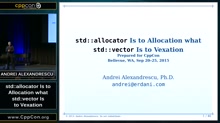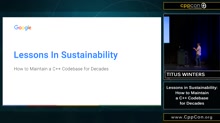CppCon 2015 string_view--Marshall Clow
 Have you registered for CppCon 2016 in September? Don’t delay – Registration is open now.
Have you registered for CppCon 2016 in September? Don’t delay – Registration is open now.
While we wait for this year’s event, we’re featuring videos of some of the 100+ talks from CppCon 2015 for you to enjoy. Here is today’s feature:
string_view
by Marshall Clow
Summary of the talk:
The library fundamentals TS contains a new class "string_view", which appears to be unlike anything else in the standard library. In this talk, we will explore the uses of string_view, when it is appropriate to use it, and when it is not. Along the way, I will discuss other possible "_view" classes, with an eye to the upcoming "ranges" proposal before the standards committee.

 Have you registered for CppCon 2016 in September? Don’t delay –
Have you registered for CppCon 2016 in September? Don’t delay –  Have you registered for CppCon 2016 in September?
Have you registered for CppCon 2016 in September?  This article changed my vision about exceptions:
This article changed my vision about exceptions: Have you registered for CppCon 2016 in September?
Have you registered for CppCon 2016 in September?  Have you registered for CppCon 2016 in September? Don’t delay –
Have you registered for CppCon 2016 in September? Don’t delay –  Interesting interview:
Interesting interview: Have you registered for CppCon 2016 in September? Don’t delay –
Have you registered for CppCon 2016 in September? Don’t delay –  Have you registered for CppCon 2016 in September? Don’t delay –
Have you registered for CppCon 2016 in September? Don’t delay –